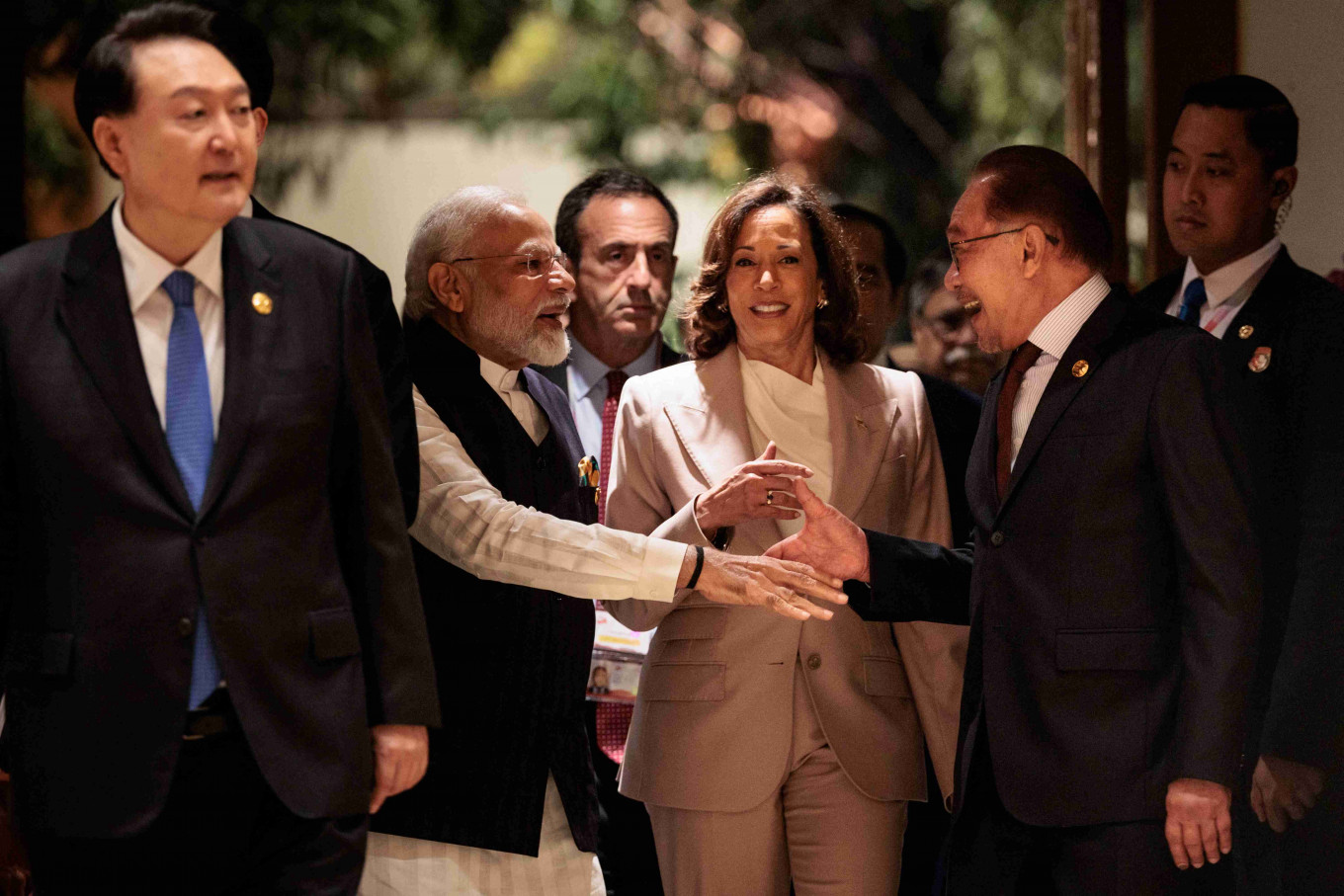Popular Reads
Top Results
Can't find what you're looking for?
View all search resultsPopular Reads
Top Results
Can't find what you're looking for?
View all search resultsASEAN calls on EAS to press pause on conflict
ASEAN has managed to achieve consensus in issuing the East Asia Summit leaders’ joint statement on maintaining and promoting the Indo-Pacific as an epicenter of growth, effectively eschewing conflict in favor of cooperation.
Change text size
Gift Premium Articles
to Anyone
A
SEAN on Thursday drew out commitments from major powers in the Indo-Pacific to set aside their differences and commit to creating “space for dialogue”, as Indonesia wraps up its chairmanship with a pledge to continue prioritizing collaboration at the next multilateral summit.
Jakarta headed into the third and final day of meetings with the 18th East Asia Summit (EAS), where top representatives from the region pledged to contribute to the ASEAN Outlook on the Indo-Pacific (AOIP), a strategy of cooperation centered on the 10-nation bloc.
The summit came amid fraught tensions between Russia and the United States and its allies over the Ukraine war, as well as between China and Japan over the decision to dump treated nuclear wastewater into the Pacific Ocean.
“After going through a difficult process, we finally agreed on the EAS leaders’ joint statement on the epicentrum of growth,” President Joko “Jokowi” Widodo said at a concluding press conference in Jakarta.
The summit adopted a leaders’ statement which declared, among other things, an agreement to promote “an enabling environment for peace, stability, good governance, prosperity and sustainable development [by] ensuring a culture of dialogue and cooperation, enhancing mutual trust and confidence and respect for international law”.
Indonesia also secured commitments from ASEAN partners to mainstream the AOIP, with the US and China putting out joint statements endorsing the strategy.
The EAS boasted 18 participants comprising the 10 ASEAN states as well as Australia, China, India, Japan, New Zealand, South Korea, Russia and the US. It had been billed as a key forum for convening the region’s powers.
Repeat success
Some leaders were notably absent from the EAS, with US Vice President Kamala Harris attending on behalf of US President Joe Biden, who had opted out of the ASEAN Summit but is scheduled to attend a summit of the Group of 20 (G20) biggest economies in India later this week.
Chinese President Xi Jinping was also absent, sending Chinese Premier Li Qiang to attend in his stead. Russian President Vladimir Putin sent veteran top diplomat Sergey Lavrov to the ASEAN meetings.
Also present as guests of the chair were the leaders of the Indian Ocean Rim Association (IORA) and of the Pacific Islands Forum (PIF), Bangladesh and the Cook Islands, respectively.
Many East Asia watchers feared the summit would be a stage where global cooperation would fall by the wayside as national and regional interests collided.
But Indonesia was determined to turn down the heat in an effort to repeat its successful G20 presidency last year, which was almost derailed by divisions over the war in Ukraine.
Earlier at the summit’s opening, Jokowi warned that every nation carries “an equally great responsibility” to create peace, stability and prosperity in the region, as well as to refrain from creating new conflicts, tensions and wars.
In his closing speech, the President called on all participants to turn the Indo-Pacific into a “theater of peace and inclusivity”, underscoring Indonesia’s approach of navigating rivalries in search of collaboration.
“This is the key foundation for ASEAN to deliver a better future for its people and the world. This is the essence of Indonesia’s chairmanship, to make ASEAN matter as an epicenter of growth,” Jokowi told fellow leaders before passing on the baton of the chairmanship over to Laos.
‘Concrete’ deliverables
At the close of the event, Jokowi boasted ASEAN’s ability to issue 90 outcome documents and a raft of “concrete” agreements with its dialogue partners, including a joint commitment from China, South Korea and Japan to help develop Southeast Asia’s electric vehicle (EV) ecosystem.
He also touted the success of hosting the first ASEAN Indo-Pacific Forum that resulted in 93 projects worth some US$38 billion that “are beneficial for the people”.
Separately, United Nations Secretary-General Antonio Guterres expressed his appreciation for ASEAN’s vital role in building “bridges of understanding” in the world.
“ASEAN’s convening power, commitment to dialogue and experience in conflict prevention are crucial pillars of stability,” Guterres told leaders of ASEAN in remarks for the ASEAN-UN Summit on Thursday.
However, some experts argue that the many statements ASEAN produced at the summit will not go far without actual implementation and continued solidarity in ASEAN.
Dafri Agussalim, executive director of Gadjah Mada University’s ASEAN Studies Center, said that while Indonesia’s achievement of coaxing its partners to agree on statements and declarations was commendable, they were still “soft rules” that still depend on ASEAN’s ability to improve its bargaining position with major powers.
“One way to do that is by strengthening solidarity and cohesiveness within ASEAN, but we know that the bloc is currently not in a good condition to do that,” Dafri told The Jakarta Post on Thursday.
He pointed to ASEAN’s inability to resolve the Myanmar coup crisis or negotiations for a Code of Conduct (CoC) in the South China Sea, which continue to drag on.
“How can we even settle issues involving other countries if ASEAN’s consensus, solidarity and centrality have not even been reached internally?” Dafri asked. (tjs)










